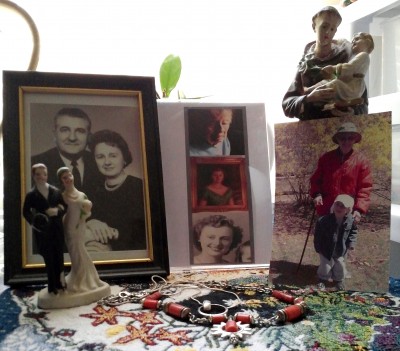He was a crowd favorite at urban poetry readings, especially at the former punk club QE2 on Central Avenue, where he screamed his edgy and ironic “White Boy” poems — often completely naked. Occasionally, he wore a baseball catcher’s mask to go with full-frontal nudity.
Such is how my once friend and colleague, Paul Weinman, is described in a tribute posted in the Albany Times Union today. He just died from the complications of Alzheimer’s. He was 75 years old. The newspaper piece celebrates Paul’s delightfully skewed lifestyle and creative pursuits and is an entertaining read even if you never knew him.
I met Paul when I began working at the New York State Museum in 1980. He already was a fixture and a legend in that institution, often annoying the staid administrators with his controversial off-site antics, while, at the same time, becoming a beloved and entertaining teacher in the Museum’s educational program. Parents and kids alike flocked to his workshops based on the Museum’s exhibits, and inner city neighborhood kids would show up in the Museum after school hours just to hang out with Paul and be entertained by his adventurous historical tales and re-enactments of life in the wilderness of the Adirondacks. He treated all kids with respect and affirmation; he dealt with adults with honest response to the way in which they dealt with him; he responded to the hypocrisies of every power structure with naively gutsy irreverence.
My professional path crossed with Paul’s because we were both poets in an institution that shared a building with the New York Sate Library and Archives and that often held literature-related events. Together, Paul and I organized and hosted the Museum’s annual “Banned Book Week” public readings. We held ekphrastic poetry events in conjunction with Museum art exhibits. We worked well together as colleagues supporting the educational mission of the New York State Museum.
Outside of our jobs, as part of the Albany poetry community, we came to know each other as writers, although our styles — in both content in presentation — had very little in common. As a challenge to my more conservative bent, one day Paul suggested that we do a collaborative poetry chapbook that explored male-female sexual tensions. I would write a poem and then he would write a poem in response. We would go back and forth like that until we had enough for a chapbook. Paul would print out and staple copies of the chapbook and then distribute it, for free, around the area, as he did with all of his poetry projects.
The whole idea was way out of my comfort zone, but Paul was pretty much an icon in the local poetry scene, and I was intrigued by both him and the challenge.

This is what the cover and back page our chapbook looked like. “Fruits of the Harvest Press” is just the name Paul gave to his own personal printing and distribution system. There’s no date on the publication, but it probably was in the late 1980s.
It took me a while to figure out how to approach the subject of sexuality, but I found a way to do it my way: through food metaphors. Hence the title: “Eating Disorders and Other Mastications.” My first effort was inspired by a Thanksgiving turkey neck.
something about turkey necks,
gizzards nestled in palm of hand,
stroked with oil,
moist heated
until firm, juice-laden,
ready for needing,
nibbling, gnawing–
lip-licking
fine night dining,
giving
thanks
And we went on from there, as I branched out from the food metaphors into other expressions of female sensuality and Paul responded with blatant come-ons such as this, which became one of his famous “White Boy” series:
IN QUIVERS OF INAD-
EQUACY, WHITEBOY TRIES
BUCKUP UP HIS IMAGE
AS HE STRUTS FOR ELAINE
A. autographing pens
strapped to hips
B. rakish hat
festooned with
panty hose
C. boots tooled
with female in-
initials, cellular
calling codes
WHITE BOY TRIPS…
POLEVAULTS ON THAT
POINT HE’S TRYING 2
GET ACROSS: ARRESTED
4 SEXUAL HARASSMENT
My relationship with Paul never moved beyond friendship, although as a willing participant in Dionysian revelry, he might have taken it in that direction. But as attracted as I often was to “bad boys,” Paul was way out of my league in that arena. Plus I got to know Paul’s wife at the time, Judith Braun , a talented visual artist who really didn’t come into her own until she divorced Paul. I liked Judith, enjoyed the bohemian parties they threw, was energized by the creative energies with which they always were surrounded. Paul caused me to stretch the boundaries of my writing and my perceptions of what is acceptable to me in both words and life.
Paul loved the lore of the Adirondacks, and he spent the last five years of his Alzheimer-ridden life making miniature chairs out of tree branches. As the newspaper tribute reports: He built miniature chairs in the Adirondack twig furniture style and left them anonymously around town with a note: “I’m an orphan chair. Please take me home and put a stuffed animal or plant on me.”
I don’t know his latest wife, but I’m going to try to contact her to see if I can get one of those chairs to hold a plant in my garden and hold his memory in my heart.










 I love it when stuff like that happens.
I love it when stuff like that happens. I printed out the images on washable fabric. I appliqued the images onto the front of a t-shirt.
I printed out the images on washable fabric. I appliqued the images onto the front of a t-shirt. 